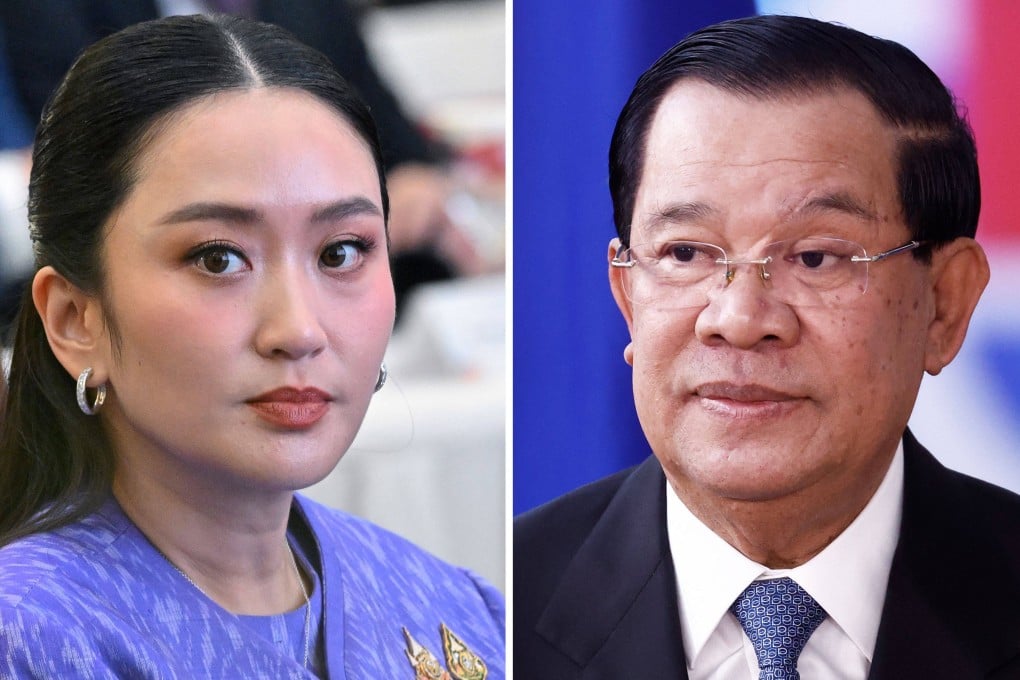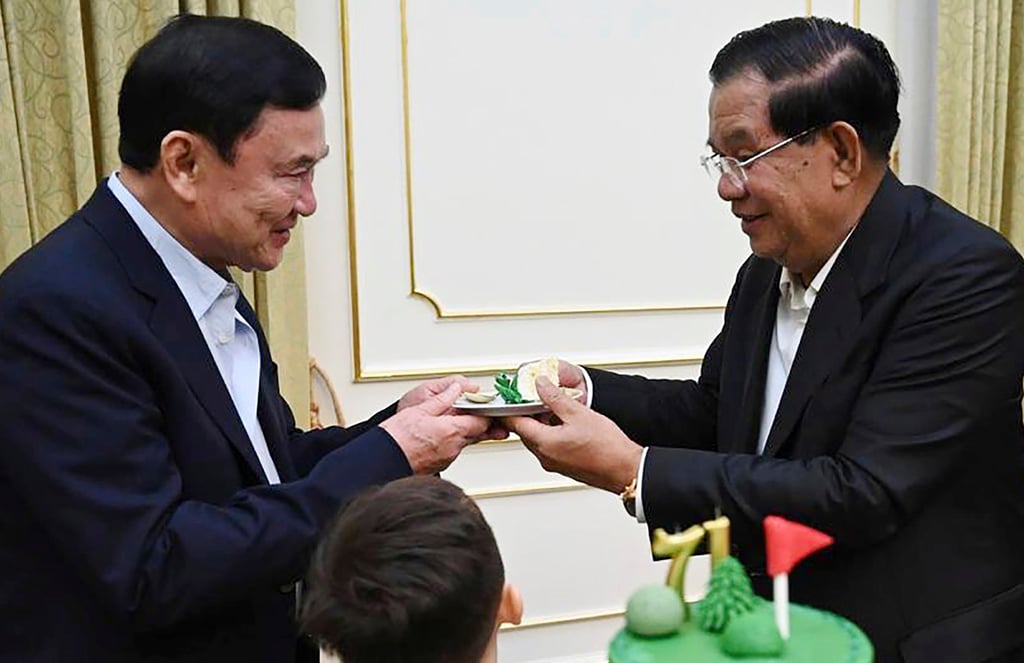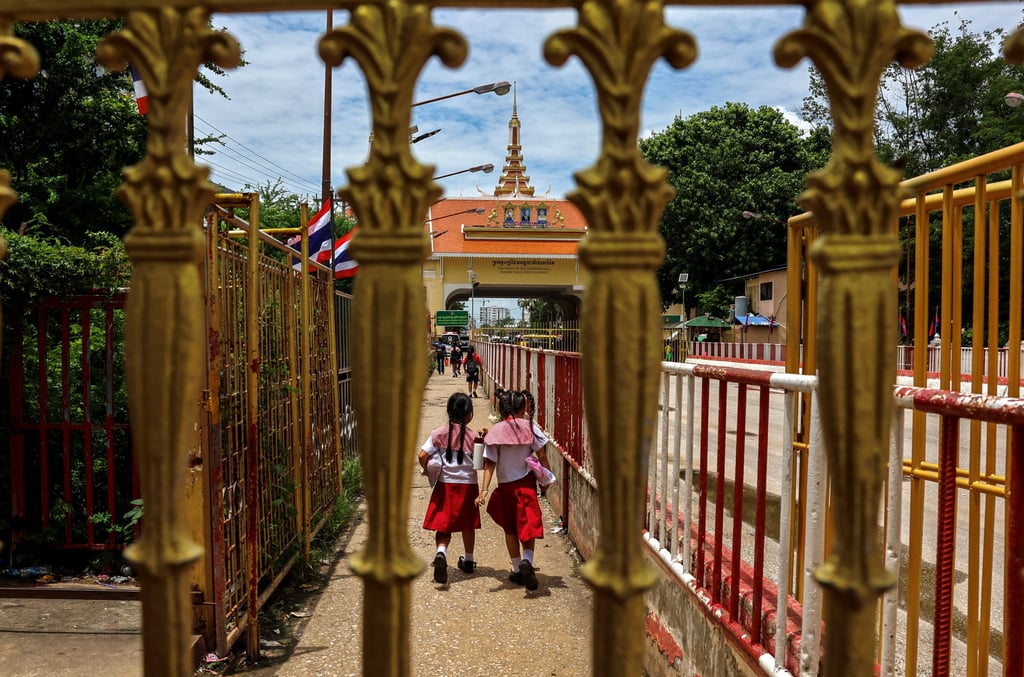The Cambodian strongman’s heated tirade is a ‘calculated’ move to boost local support while deflecting international scrutiny, analysts say

Taking particular issue with Paetongtarn referring to her own commander as an “opponent”, Hun Sen argued that the remark constituted “an insult to the king”.
“An insult to a regional commander is an insult to the Thai king because it is only the king who issued a royal decree to appoint him,” the Cambodian Senate president said in the live stream on his official Facebook page.
That interpretation has been echoed in a petition filed by 36 Thai senators to the Constitutional Court, alleging that Paetongtarn’s comments might have seriously violated ethical standards by undermining the authority of a royal-appointed military commander – and by extension, the monarchy itself. The court is set to decide on Tuesday whether to accept the case, which could lead to her suspension from office.
The Cambodian strongman also said that the global rise in call centre scams originated from Thailand, calling on international authorities to conduct thorough investigations.
Calculated diversion?
The sudden rapid downturn of bilateral ties was surprising, given the good ties between the ruling families in Cambodia and Thailand, said Abdul Rahman Yaacob, a research fellow with the Southeast Asia programme at Australia’s Lowy Institute.
One reason could be Hun Sen’s attempt to “divert attention away” from Cambodia’s scam centres, he said, pointing to a recent Amnesty International report saying that the kingdom was deliberately ignoring human rights issues and torture related to such centres.
Hun Sen’s comments on Thaksin could also be a “calculated assessment”, he added. “Hun Sen might have decided to discredit Thaksin and his daughter” after evaluating that the Shinawatras were out of favour with both the Thai military and monarchy.
“[He] is seeking to put the final nail in the coffin on the Thai government led by Paetongtarn,” Rahman said, adding that Hun Sen might be hoping that once the Paetongtarn administration was removed from power, the border situation would return to normal.

“This assessment is also shared within the Cambodian military,” Rahman said. In his research last year, he was told that Cambodia was often used as a “punching bag” during Thai domestic political disputes whereby Thai political parties and the military often used the kingdom “as a conduit to attack their opponents”.
Purawich Watanasukh, a political science lecturer at the Thammasat University in Bangkok said Hun Sen’s comments added further pressure on Paetongtarn, which was not expected to ease off any time soon. “These tensions are likely to persist, as they have significant implications for domestic politics in both Thailand and Cambodia,” he said.
Hun Sen’s suggestion that Thaksin was not genuinely ill had already circulated widely in Thailand over the past year. “What stands out, however, is the way he has chosen to escalate pressure, particularly in the aftermath of the leaked phone call,” Purawich said.
By claiming that scammers were originating from Thailand, Hun Sen was attempting to both stir up “nationalist sentiment” for domestic politics and deny that his country was a hub for scam operations.
How to defuse tensions?
Sophal Ear, associate professor at the Thunderbird School of Global Management at Arizona State University, said Hun Sen’s about-turn stemmed from his “confrontational rhetoric”.
“[It] reflects his established pattern of leveraging bold statements to consolidate domestic political support and assert Cambodia’s position regionally,” Ear said, adding that Hun Sen’s threats to “expose” the Shinawatras and claims about Thaksin’s health appeared “strategically aimed at escalating diplomatic pressure”.
“These comments resonate domestically by projecting strength and nationalist sentiment but simultaneously risk diplomatic backlash, undermining mutual trust and potentially destabilising regional relations.”
To repair ties, Ear said both nations should swiftly prioritise diplomatic engagement and confidence-building measures, as well as meet for high-level dialogues that were mediated by neutral Southeast Asian members.
These, as well as a recommitment to previously established frameworks for border management and economic collaboration, would potentially address misunderstandings and publicly reduce tensions.
“A conscious reduction in inflammatory public rhetoric will be essential in stabilising the relationship and fostering a productive diplomatic atmosphere,” Ear said, adding that strengthening regional mediation capacities was also instrumental in preventing further escalation and ensuring regional stability.

“More likely, Bangkok perceives that it has an upper hand if the negotiations are done at bilateral level,” Rahman said, adding that ties were unlikely to see an upswing soon as the ongoing conflict was driven by Thai domestic politics.
Tensions have heightened ever since, with both sides massing troops at different checkpoints along the 800km (497-mile) border. Crossings were either closed or had their opening hours reduced.
Additional reporting by Agence France-Presse

2 comments:
Thanks to the devil Hun Sen, the leaders in the world will never want to talk to Khmer leaders again. Hun Sen's attacks on Thai PM will have a devastating impact on future Khmer leaders. They would think that Khmer leaders are untrustworthy and dishonest.
The King of Brunei might have withdrawn his relationship from his god evil brother Hun Sen already
.
A person with the right mind would never do that to a friend. It is simply immoral. Now, the world knows how evil Hun Sen is.
In any circumstance, Hun Sen still put his personal interest (power for Hun family) above Cambodia's interest. That's why it is difficult for Hun Sen to allow Khmer patriots, mainly the CNRP’s members, to join his call for solidarity.
The presence of the CNRP's members in Cambodia will definitely jeopardize his son’s chance of winning this next general election.
Hun Sen is one of a kind of evil.
Post a Comment